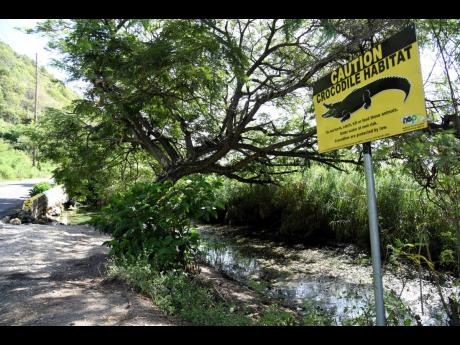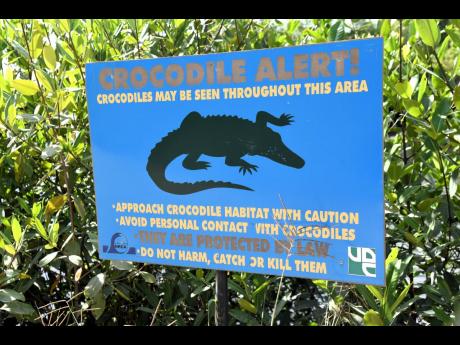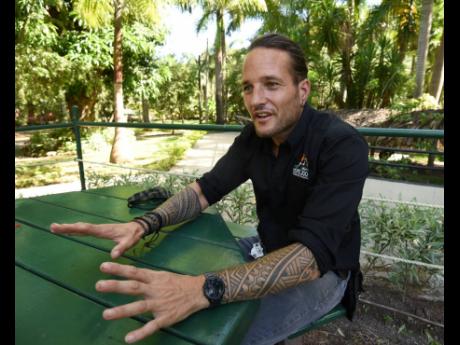Crocs biting into goat farmers’ profits
Biologist suggests fencing, gov’t compensation as reptile threatens livelihoods in Clarendon
While people in the agricultural sector are often on the lookout for crooks plundering their crops and livestock, in Farquhar Beach, Clarendon, the goat farmers are more worried about a different predator: the American crocodile.
Known scientifically as Crocodylus acutus, the endangered reptile, which is protected by law, lives in the wetlands not far from some communities in the parish.
Given that there is only one way in or out of the community, which would mean passing the police station twice, one goat farmer, who goes by the moniker ‘Ziggy’, told The Gleaner that the area is not typically targeted by farm thieves.
However, he admitted that, like many other farmers in the region, he has lost valuable livestock to crocodile attacks.
He explained that his goats are typically left to graze and often visit the nearby Milk River for a drink of water and to munch on the blossoms of nearby fruit trees.
“Sometimes, before dem go near the water, the crocodile chuck out a di water on them,” Ziggy said, the pain of the memory evident on his face.
He told The Gleaner how heartbreaking it was to helplessly witness some of the crocodile attacks. He also recalled observing teeth marks on the necks of the animals after going into the river to examine their floating carcasses.
“When him (crocodile) catch dem, him nuh just eat them so. Him catch dem and drown them [and wait] ‘til dem spoil. Them nuh eat fresh meat,” he explained.
Ziggy has been earning his keep by raising goats for the last six years. But, after racking up several thousands of dollars in losses, including a recent incident in which he lost two goats valued at $90,000 to the crocodiles, he is now monitoring them more closely.
CHALLENGING
It is quite a challenge, however, as, if he is tardy in journeying to the areas they frequent, he could stumble upon at least one dead goat floating in the river.
“Me feel a way ‘bout [losing] dem because a one a me nice mother goat. Call it say a one a me best mother goat,” he said of the latest incident.
Ziggy noted that while he tries to avoid the reptile, some other goat farmers attempt to capture the reptiles. He said that he would rather lose more goats than risk his life trying to protect the herd.
“The goat can’t buy back my life, but me can buy back more goat. But you have some man weh will say, ‘Mi a dead with mi [goat]’, but no sah, a nuh so it go,” he reasoned.
Meanwhile, fellow goat farmer Jermaine said that, although they were fearful of the crocodiles, they could not stand idly by, as the reptiles kill their livelihoods.
“If you have your job and somebody wah tek it from you, you have fi go fight fi yuh job, don’t it?” he asked, noting that, when they call the National Environment and Planning Agency for assistance, they are not usually receptive to their pleas to remove the crocodiles from the area.
Jermaine said that he has lost two goats in a day to the crocodiles – one in the morning and another in the afternoon when he lets them out to graze. So far this year, he has lost four animals in attacks, racking up roughly $120,000 in losses.
“Dem will set trap for him and him burst it because him too big ...,” he said of attempts to catch the reptile, adding that the farmers were not happy to resort to this action. “But wah we fi do? A we goat dem. We can’t make him kill them off.”
ROUGH IN RAINY SEASON
He said that things are particularly rough in the rainy season when the water rises in the river and the crocodiles venture into the swamps nearest to the community.
Joseph ‘Joey’ Brown, a conservation biologist and curator at the Hope Zoo Preservation Foundation, told The Gleaner that he understands how important it is for families to put food on the table, and that, particularly in poorer regions, crocodiles are affecting people’s livelihoods.
He is advising farmers to exert more control over their animals and to prevent them from wandering into crocodile habitats. Otherwise, “it’s like putting a free meal” in front of the reptiles, he added.
Brown suggested the erection of some form of fencing near the waterways, to help deter livestock engagement with crocodiles.
“There are some countries that offer like a reimbursement programme, where, like if a farmer’s goat is killed, then the government would reimburse that farmer because they also want to protect the species that killed their livestock,” he said, which would prevent retaliation from the locals.
He said the Jamaican Government could consider the implementation of such an initiative to prevent additional endangerment.
On the other hand, the conservationist noted that people typically respond adversely towards crocodiles out of fear, and that many, as a result, begin to illegally poach them to protect their homes and means of living.
He placed the blame for such occurrences on the lack of education and outreach initiatives being done across the country, as many locals are unaware of how they can coexist with the reptile, and are often not sure what to do when one is spotted.



